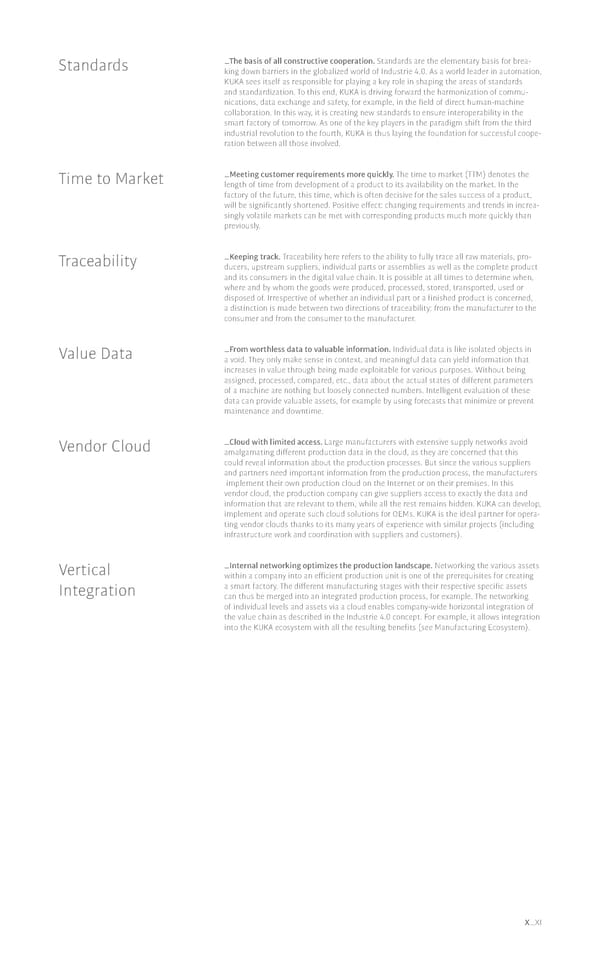Standards �The basis of all constructive cooperation. Standards are the elementary basis for brea- king down barriers in the globalized world of Industrie 4.0. As a world leader in automation, KUKA sees itself as responsible for playing a key role in shaping the areas of standards and standardization. To this end, KUKA is driving forward the harmonization of commu- nications, data exchange and safety, for example, in the field of direct human-machine collaboration. In this way, it is creating new standards to ensure interoperability in the smart factory of tomorrow. As one of the key players in the paradigm shift from the third industrial revolution to the fourth, KUKA is thus laying the foundation for successful coope- ration between all those involved. Time to Market �Meeting customer requirements more quickly. The time to market (TTM) denotes the length of time from development of a product to its availability on the market. In the factory of the future, this time, which is often decisive for the sales success of a product, will be signi昀椀cantly shortened. Positive e昀昀ect: changing requirements and trends in increa- singly volatile markets can be met with corresponding products much more quickly than previously. Traceability �Keeping track. Traceability here refers to the ability to fully trace all raw materials, pro- ducers, upstream suppliers, individual parts or assemblies as well as the complete product and its consumers in the digital value chain. It is possible at all times to determine when, where and by whom the goods were produced, processed, stored, transported, used or disposed of. Irrespective of whether an individual part or a finished product is concerned, a distinction is made between two directions of traceability: from the manufacturer to the consumer and from the consumer to the manufacturer. Value Data �From worthless data to valuable information. Individual data is like isolated objects in a void. They only make sense in context, and meaningful data can yield information that increases in value through being made exploitable for various purposes. Without being assigned, processed, compared, etc., data about the actual states of different parameters of a machine are nothing but loosely connected numbers. Intelligent evaluation of these data can provide valuable assets, for example by using forecasts that minimize or prevent maintenance and downtime. Vendor Cloud �Cloud with limited access. Large manufacturers with extensive supply networks avoid amalgamating di昀昀erent production data in the cloud, as they are concerned that this could reveal information about the production processes. But since the various suppliers and partners need important information from the production process, the manufacturers implement their own production cloud on the Internet or on their premises. In this vendor cloud, the production company can give suppliers access to exactly the data and information that are relevant to them, while all the rest remains hidden. 阀阀 can develop, implement and operate such cloud solutions for OEMs. 阀阀 is the ideal partner for opera- ting vendor clouds thanks to its many years of experience with similar projects (including infrastructure work and coordination with suppliers and customers). Vertical �Internal networking optimizes the production landscape. Networking the various assets within a company into an e昀昀icient production unit is one of the prerequisites for creating Integration a smart factory. The di昀昀erent manufacturing stages with their respective speci昀椀c assets can thus be merged into an integrated production process, for example. The networking of individual levels and assets via a cloud enables company-wide horizontal integration of the value chain as described in the Industrie 4.0 concept. For example, it allows integration into the 阀阀 ecosystem with all the resulting bene昀椀ts (see Manufacturing Ecosystem). X�XI
 Embracing Industrie Page 100 Page 102
Embracing Industrie Page 100 Page 102